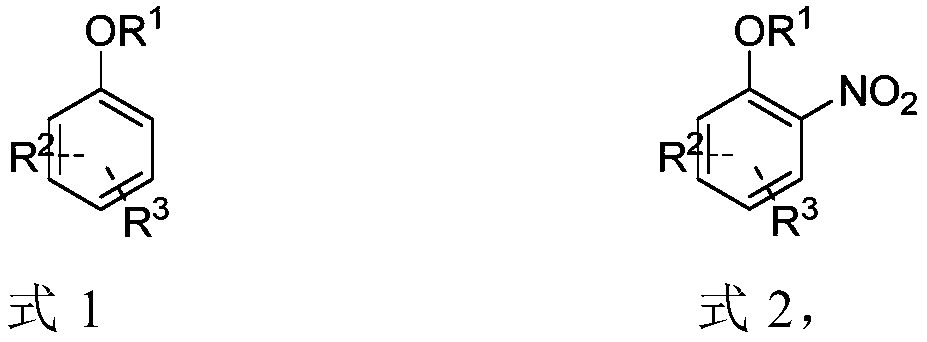Nitration method for aryl phenol or aryl ether derivative
A technology of derivatives and aryl ethers, applied in the field of organic synthesis, can solve the problems of many by-products, many by-products of amplification reactions, and safety risks, and achieve the effects of being beneficial to industrial production, simplifying production processes, and reducing production costs
- Summary
- Abstract
- Description
- Claims
- Application Information
AI Technical Summary
Problems solved by technology
Method used
Image
Examples
Embodiment 1
[0045] React according to the following reaction equation:
[0046]
[0047] Substrate:; Target product: (C 8 h 9 NO 4 );
[0048] The specific operation steps are: p-xylylene dimethyl ether (100mmol), TMSCl (2 equivalents, 200mmol), guanidine nitrate (1.4 equivalents, 140mmol), copper sulfate pentahydrate (0.1 equivalents, 10mmol) and acetonitrile (100mL) were added to 250mL in a round bottom flask. The reaction was stirred well at room temperature for 12 hours and monitored by TLC. After the reaction was completed, it was filtered, and then the solvent was removed by a rotary evaporator, using petroleum ether (PE) / ethyl acetate (EA) as an eluent, and silica gel (200 mesh) was used for column chromatography purification. The result is 2-nitro-1,4-dimethoxybenzene.
[0049] Yellow solid: Yield=96%, 1 H NMR (400MHz, Chloroform-d) δ.39 (dd, J = 3.2, 1.6Hz, 1H), 7.11 (ddd, J = 9.2, 3.1, 1.5Hz, 1H), 7.03 (dd, J = 9.2, 1.4 Hz,1H), 3.91(s,3H), 3.81(s,3H).
Embodiment 2-19
[0050] Embodiment 2-19 all reacts by following reaction equation:
[0051]
[0052] The specific operation steps are: substrate (0.5mmol), TMSCl (2 equivalents, 1mmol), guanidine nitrate (1.4 equivalents, 0.7mmol), copper sulfate pentahydrate (0.1 equivalents, 0.05mmol) and acetonitrile (3mL) were added to 10mL in the snark tube. The reaction was stirred well at room temperature for 2-24 hours and monitored by TLC. After the reaction was completed, the solvent was removed by a rotary evaporator, and column chromatography was performed on silica gel (200 mesh) using petroleum ether (PE) / ethyl acetate (EA) as an eluent.
Embodiment 2
[0054] Substrate: Target product: (C 6 h 4 FNO 3 );
[0055] Yellow solid: Yield = 57%, 1 H NMR (400MHz, Chloroform-d) δ10.36(s, 1H), 7.82(dd, J=8.1, 3.1Hz, 1H), 7.36(ddd, J=9.3, 7.2, 3.1Hz, 1H), 7.16( dd, J = 9.2, 4.6 Hz, 1H).
PUM
 Login to View More
Login to View More Abstract
Description
Claims
Application Information
 Login to View More
Login to View More - R&D
- Intellectual Property
- Life Sciences
- Materials
- Tech Scout
- Unparalleled Data Quality
- Higher Quality Content
- 60% Fewer Hallucinations
Browse by: Latest US Patents, China's latest patents, Technical Efficacy Thesaurus, Application Domain, Technology Topic, Popular Technical Reports.
© 2025 PatSnap. All rights reserved.Legal|Privacy policy|Modern Slavery Act Transparency Statement|Sitemap|About US| Contact US: help@patsnap.com



